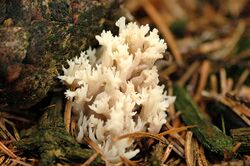Biology:Clavulina
| Clavulina | |
|---|---|

| |
| Clavulina coralloides | |
| Scientific classification | |
| Kingdom: | |
| Division: | |
| Class: | |
| Order: | |
| Family: | |
| Genus: | Clavulina J.Schröt. (1888)
|
| Type species | |
| Clavulina cristata (Holmsk.) J.Schröt. (1888)
| |
Clavulina is a genus of fungus in the family Clavulinaceae, in the Cantharelloid clade (order Cantharellales). Species are characterized by having extensively branched fruit bodies, white spore prints, and bisterigmate basidia (often with secondary septation). Branches are cylindrical or flattened, blunt, and pointed or crested at the apex, hyphae with or without clamps, basidia cylindrical to narrowly clavate, mostly with two sterigmata which are large and strongly incurved and spores subspherical or broadly ellipsoid, smooth, and thin-walled, each with one large oil drop or guttule.[1] The genus contains approximately forty-five species with a worldwide distribution, primarily in tropical regions.[2] Species of Clavulina are mostly ectomycorrhizal. A recent study has identified Clavulina to the genera level as present on Nothofagus menziesii adventitious roots[3]
Species
- C. alutaceosiccescens
- C. amazoensis
- C. amethystina
- C. amethystinoides
- C. arcuatus
- C. brunneocinerea
- C. caespitosa
- C. cartilaginea
- C. cavipes
- C. cerebriformis[4]
- C. chondroides
- C. cinerea
- C. cinereoglebosa[4]
- C. cirrhata
- C. coffeoflava
- C. connata
- C. copiosocystidiata
- C. coralloides
- C. craterelloides
- C. cristata
- C. decipiens
- C. delicia
- C. dicymbetorum
- C. effusa[4]
- C. floridana
- C. gallica
- C. geoglossoides
- C. gigartinoides
- C. gracilis
- C. griseohumicola
- C. hispidulosa
- C. humicola
- C. humilis
- C. incrustata
- C. ingrata
- C. iris
- C. kunmudlutsa
- C. leveillei
- C. limosa
- C. monodiminutiva
- C. mussooriensis
- C. nigricans
- C. ornatipes
- C. panurensis
- C. puiggarii
- C. purpurea
- C. ramosior
- C. rugosa
- C. samuelsii
- C. septocystidiata
- C. sprucei
- C. subrugosa
- C. tasmanica
- C. tepurumenga
- C. urnigerobasidiata
- C. vinaceocervina
- C. viridula
- C. wisoli
Distribution
Clavulina species are important primary colonizers of forest litter, and occur immediately after the pre-monsoon showers. Two species of Clavulina – C. coralloides(known as white or crested coral fungus) and C. rugosa – have been recorded from the moist-deciduous to evergreen forests of the Western Ghats, Kerala, India.[1]
References
- ↑ 1.0 1.1 1.2 Mohanan C. (2011). Macrofungi of Kerala. Kerala, India: Kerala Forest Research Institute. pp. 597. ISBN 81-85041-73-3.
- ↑ Thacker J, Henkel TW. (2004). "New species of Clavulina from Guyana". Mycologia 96 (3): 650–7. doi:10.2307/3762182. PMID 21148885. http://www.cybertruffle.org.uk/cyberliber/59350/0096/003/0650.htm.
- ↑ Orlovich et al, 2013 Piracy in the high trees: ectomycorrhizal fungi from an aerial 'canopy soil' microhabitat
- ↑ 4.0 4.1 4.2 Uehling JK, Henkel TW. (2012). "New species of Clavulina (Cantharellales, Basidiomycota) with resupinate and effused basidiomata from the Guiana Shield". Mycologia 104 (2): 547–56. doi:10.3852/11-130. PMID 22067306.
Wikidata ☰ Q336963 entry
 |
